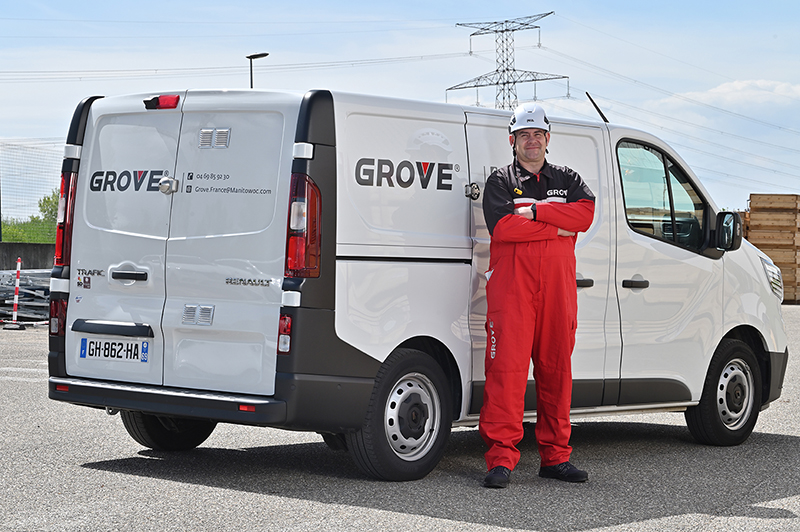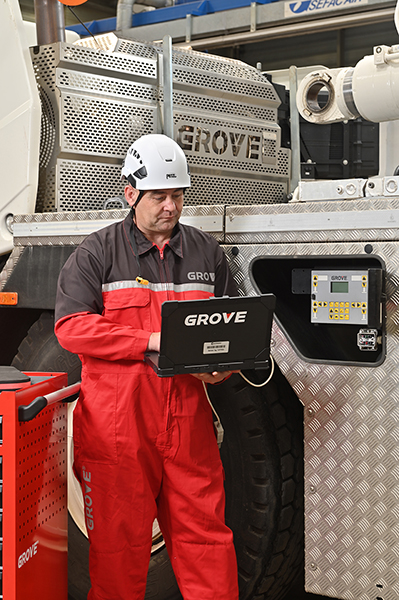
Glasgow-based Sandy McCulloch is one of three service technicians dedicated to keeping the Manitowoc mobile cranes, crawler cranes and boom trucks of Scotland in top condition. With three decades of experience under his belt, here he delves into his career journey, the industry shifts he’s seen, and the reality of supporting customers in Scotland’s remote Highlands and Islands.
Q) How did you first get into the crane industry?
A) I was a curious kid, always getting into trouble for taking things apart to see how they worked. Bicycles, electronics – you name it, I had it in pieces. My school’s careers advisor encouraged me to take a test with CITB (Construction Industry Training Board) to see if I was suited to a mechanical apprenticeship. I went through a rigorous process of aptitude tests and interviews, which was daunting for a 15-year-old, but ultimately led to a great apprenticeship with Hewden Stuart, a huge plant hire firm in Glasgow.
Once I got in, I was so excited to have all these mechanical toys to play with alongside my college studies. Cranes weren’t on my radar until then but soon became my passion. Even today, my family finds it funny how I can’t help but point out cranes to them and I always feel a sense of pride whenever I spot one of ‘ours’ hard at work on a jobsite.
Q) How did your career progress from there?
A) At its height, Hewden Stuart was one of the biggest plant hire operations in Europe and I spent eight-and-a-half years there as an apprentice and fully qualified engineer looking after all types of cranes in the fleet. I then moved to Samuel Walker & Sons, which served as Grove’s UK distributor at the time. After about another eight-and-a-half years, Manitowoc took over operations in the UK directly so that’s when I joined the Manitowoc team. Because I already knew the products, I hit the ground running and I’ve now been at Manitowoc for 17 years.
Q) How has the crane industry changed over that time?
A) So much – and in a way that really helps us in Scotland. The engineering design and strength of today’s cranes is amazing. They are so much more compact relative to their lifting capacity, which makes them far easier to transport on Scottish roads. When you head north from Glasgow to the west coast, there are no more motorways. It’s all A-roads, which are often single carriageways.
What’s more, sometimes places might look close on the map but are remote in terms of travel time. If I need to go to help a customer in Inverness, for example, that could be four hours’ drive from Glasgow. So remote diagnostics have also been a game-changer. While some telematics struggle in truly remote areas between hills and mountains, where there is a strong signal, we can diagnose issues quickly and arrive prepared with the parts we might need.
Another important change is the wealth of information now at our fingertips as service technicians. We get extensive training, not only internally but also from our engine and wire lifting rope suppliers and they’ve taken things to a whole new level with detailed literature on the designs. Equipped with this know-how, we can often troubleshoot over the phone and guide a customers’ own engineers through it. We are now empowered with a vast toolkit to assist customers in completing their projects quickly and efficiently.
Q) What do you enjoy most about being a crane service technician?
A) I enjoy the travel and meeting new people and get immense job satisfaction from fixing things. I love diving headfirst into a problem and finding a way to make things tick again. It’s like a puzzle and when you solve it, it’s a real victory. But what keeps me on my toes is the sheer diversity of the job. No two days are the same. One day, I could be heading to a customer’s site to repair a crane and the next I might be the go-to person advising an operator on how to properly maintain their machine. Sometimes I might guide an engineer through some intricate drawings for a tricky job, and there’s always the routine service checks.
What also stands out for me is that the Manitowoc management team isn’t all about handing down black-and-white instructions. It’s a two-way street, a real conversation. I count myself lucky because I genuinely enjoy the camaraderie and team spirit of the people I work alongside.
Q) What are the key skills you need to succeed as a crane service technician?
A) First, you’ve got to be approachable and have great people skills. Building trust with customers is crucial so that they are comfortable seeking your assistance. Flexibility is another must-have trait. When a customer calls, you might need to shuffle your schedule to help them quickly get their crane back in action. Patience is vital, especially when troubleshooting or repairing. Rushing doesn’t cut it. Sometimes, you’ve got to take a step back and methodically work through the problem. And finally, you need a thirst for knowledge. It helps to stay open to learning from everyone as diverse experiences and ideas are everywhere.
My advice to anyone, regardless of their level, would be to ask lots of questions and truly listen; you’ll uncover some incredible stories and lessons along the way.








